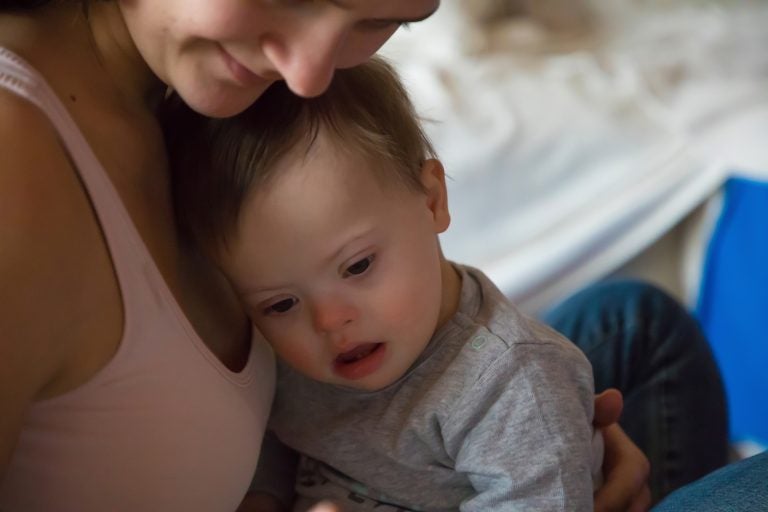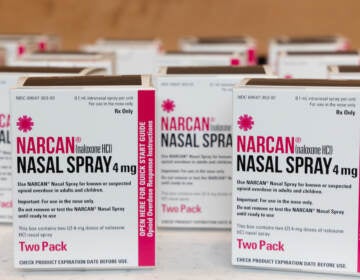Pa. bill banning abortions for Down syndrome divides special needs community
A bill making its way through the Pa. legislature has split a community brought together by a common diagnosis, and it could be the next front in the abortion debate.
Listen 9:36
In April, the Pa. House passed a bill that would ban abortions in cases where there was a prenatal diagnosis of Down syndrome. The legislation is dividing the special needs community. (Big Stock Photo)
Lynne and Kevin Eddis had a difficult time starting a family.
“I actually had three miscarriages before I became pregnant with Hazel,” she said as her 20-month-old daughter coos happily on the floor of the couple’s West Mount Airy home in Philadelphia. And while she can’t yet walk, Hazel squirmed and rolled around the room with ease.
Hazel also has Down syndrome. Her diagnosis came as a shock to both parents.
“I remember being at work, and Kevin and I at the time worked together, and the genetic counselor called me,” said Lynne. “Before I got off the phone, I remember being like, ‘Well do you know, can you just tell me what the sex of the baby?’ ‘Cause literally it was the weirdest thing, like I got this devastating diagnosis, and I left the office, and I went over to Kevin’s desk, and I was crying.”
At the time, Lynne was about 17 weeks pregnant, past the end of the first trimester. An amniocentesis to confirm the diagnosis took another couple weeks. In Pennsylvania, a pregnant woman has until 24 weeks to terminate a pregnancy. The clock was ticking.
“It was hard. Having had three miscarriages, and that whole idea of what your family is going to be like … is just completely turned upside down,” Lynne said.
Many parents in their situation say their world shifts the moment they get a diagnosis of Down syndrome. There are so many questions: Can I handle this? Can I give this child what they need? Can I afford to quit my job or scale back my hours? Who will take care of them when I’m gone?
“There was a lot of crying,” said Lynne. “A lot of crying.”
The couple decided to move forward with the pregnancy. A few months later, Hazel was born.
“I think all that worry we had beforehand went away the second she was born,” said Kevin.
A bill in the Pennsylvania legislature would make it so families like the Eddises no longer have a choice.
Last month, the Pennsylvania House passed a bill that would ban abortions in cases like Hazel’s where there was a prenatal diagnosis of Down syndrome. The bill has yet to be taken up in the Senate, and Gov. Tom Wolf has said he would veto it if it reaches his desk.
But as it works its way through the legislature, the bill is creating deep divisions within the special needs community, which is normally mutually supportive and universally enthusiastic about their children and their abilities.
Discrimination or the right to choose?
Lynne and Kevin Eddis love their daughter and believe her life is worth living, but they don’t support the bill.
“I’m pro-choice,” said Lynne. “I believe that it’s a woman’s right to choose to keep a child or not … We made the right choice for us. I don’t think that it’s the government’s right to tell somebody that they have to have a child because they have a certain diagnosis.”
But supporters of the bill, like Jeremy Samek, frame it as anti-discrimination legislation. Samek is senior counsel with the pro-life Pennsylvania Family Institute. The group points to countries like Iceland, where nearly all Down syndrome pregnancies are terminated.
“When they promote it, they talk about it being an eradication of Down syndrome as if they’ve eradicated a disease,” Samek said. “But we would never say that we’ve eradicated homelessness by eradicating homeless people, and I think that’s essentially what they’re doing here.”
Samek sees the example of Iceland, as the systematic purge of a group of people, and the start of genetic engineering.
“When we look at the word ‘eugenics’ itself, this fits squarely within that box,” he said. “It’s an effort to look at society and say, ‘This is what we think the standard of perfection is when it comes to human beings’ … And those kind of things ought not happen.”
Samek speaks from a position at an organization opposed to abortion, as well as the parent of a child with Down syndrome — a three-year-old daughter he and his wife adopted about a year ago.
“She’s doing wonderful,” he said. “She has four older brothers. She engages everybody she meets, smiles at strangers, waves at strangers, talks to strangers in her own chatty language.”
Opinions among members of the Down syndrome community run the gamut. On one end of the spectrum are staunch anti-abortion advocates like Samek who are troubled by terminating pregnancies for any reason — and the eradication of those with Down syndrome in particular. On the other end are those like Lynne and Kevin Eddis who are pro-choice and who made personal decisions to keep their children, but feel that forcing others to do the same is a slippery slope that erodes abortion rights.
Others are in the middle — parents who support abortion rights, but believe high abortion rates after a Down syndrome diagnosis in some countries requires the government to intervene.
But parents opposed to the bill say their voices aren’t always heard in the conversation. Lynne Eddis belongs to several online support groups for parents of children with Down syndrome, a community that seems to be disproportionately anti-abortion.
“Sometimes I see a few things that are written and I’m just like, I’m just going to step away, ‘cause everybody has their opinions and everybody is entitled to their opinions,” she said.
‘A really tough issue’
At the heart of the debate is a question: Can the government stop parents from choosing which children to have?
It’s not an easy one to answer.
Women in Pennsylvania can have an abortion for any reason with one exception.
Pennsylvania is one of eight states where you cannot terminate a pregnancy because of the sex of the baby. In two of those eight, Illinois and Indiana, the laws have been blocked by federal judges.
“I think this is a really tough issue,” said Temple University law professor Rachel Rebouche. “If you ask most people, should people be able to terminate pregnancies for any reason and what about if the reason is, you know, eye color or sex, gender … people start to have very complicated reactions.”
The bill also raises the question of enforcement. On the face of it, someone who wanted to abort a child with Down syndrome could simply not give any reason for ending the pregnancy. Samek acknowledges that.
“I do think that there’s absolutely a method for somebody who was very, very much intent on doing this, and doctors are complicit with it, that somebody could get away with it,” he said. “But I do think that the majority of people who are being put in this situation are ones who aren’t doing it for any other reason.”
Rebouche agrees these laws still leave some degree of latitude. She points to Louisiana which bans abortions based on genetic abnormalities, including Down syndrome.
“In theory, if a pregnant person says, ‘I don’t want to have a child with Down syndrome, and this pregnancy has been really hard,’ or ‘I’m worried about my health,’ or offers any other reason, it seems to me that a law like the one in Louisiana would only catch people who say the only reason that they are terminating a pregnancy is because of that diagnosis,” Rebouche said.
But the most vociferous critics of the legislation argue it has nothing to do with Down syndrome at all.
“I think it’s reprehensible that they are using children with Down syndrome as a wedge in this issue,” said Rabbi Mordechai Liebling, a Philadelphia activist who supports various liberal causes and also has a 27-year-old son with Down syndrome.
“The world is definitely a far richer place to have people with Down syndrome in it, but that is not the reason to pass a law that denies women’s right to choose,” Liebling said.
Rebouche agrees lawmakers pushing the bill seem to have wider motivations.
“It’s clear that these laws are being passed by Republican legislators based on model legislation that Americans United for the Defense of Life publishes,” she says. “They every year publish a state guide that gives people examples of laws they could pass in their state, and the laws are designed to really test the constitutional claims that attach to abortions.”
A group of model bills released by Americans United for the Defense of Life includes one called the “Prenatal Nondiscrimination Act.” Similar laws to the one proposed in Pennsylvania have already passed in four other states. Two in Ohio and Indiana have been blocked following court challenges from the ACLU.
And when the bill’s sponsor, Pennsylvania House Speaker Mike Turzai, talked about the bill on the house floor, he talked about more than just Down syndrome.
“In the end, abortion is a violent act not against potential life but against a living, growing human being, a life with potential,” he said.
If the bill passes, pro-choice interest groups, including Planned Parenthood, are already vowing to fight it in court.
“A woman would want to know that this decision belongs to her,” said Dayle Steinberg, President and CEO of Planned Parenthood’s Southeastern Pennsylvania chapter. “It’s hers to make with her family, her support system, her healthcare provider, and her faith when appropriate. And it’s really not our place to judge.”
Rebouche predicts the issue could ultimately wind its way to the U.S. Supreme Court, and a ruling at that level could have widespread implications for abortion rights.
“If the Supreme Court decides that states can decide the reason for abortion, many people think that’s the one-way route to overturning Roe,” says Rebouche, citing the 1973 court decision that legalized abortion. “Because then how do you distinguish which reasons the state can say are valid and which reasons are not?”
WHYY is your source for fact-based, in-depth journalism and information. As a nonprofit organization, we rely on financial support from readers like you. Please give today.





